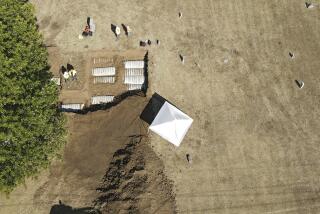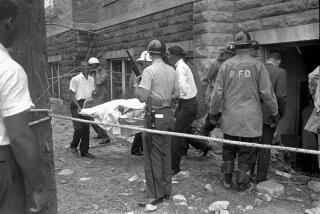Last Davidians Mourn Dead of Oklahoma City, Waco
- Share via
WACO, Texas — The glimmer of a maroon and gray headstone stood out among the memorials for the 70 Branch Davidians on the sun-splashed prairie where they died four years ago Saturday after a standoff with the government.
“In remembrance of all the men, women and children who were victimized and brutally slaughtered in the bombing of the Oklahoma City Federal Building,” reads the marker, dated April 19, 1997.
The monument to the 168 killed two years ago in Oklahoma City was erected by a religious group identified on the stone as the Branch Congregation of the Lord Our Righteousness. It gave permanence to the inextricable link between two of the greatest tragedies on American soil in recent history.
There is a heightened sense of tension on April 19, when anniversaries of both events are observed. In Denver, Timothy J. McVeigh is on trial for the bombing, which prosecutors suggest he carried out in retaliation for the government raid on the Davidians’ compound exactly two years earlier.
About 100 people gathered peacefully for a memorial service at the site of the Branch Davidian siege, which ended when fire swept through the religious group’s compound.
“I think the Oklahoma City bombing was a tragedy that should have never taken place,” said Clive Doyle, who survived the fire and was later acquitted of weapons charges. “I do not promote or like anybody using us as an excuse to take action against others.”
The siege began after Bureau of Alcohol, Tobacco and Firearms agents tried to arrest sect leader David Koresh on weapons charges. The raid erupted into a gun battle that left four federal agents and six Davidians dead.
After weeks of negotiations, the FBI sent in armored vehicles to flush the cultists out with tear gas. Ultimately, the complex erupted in flames.
The government said the Davidians started the fire, but the 250 surviving sect members and relatives of the dead are challenging that conclusion in a lawsuit.
Standing on the ground where the tanks battered the Mount Carmel compound before it burned, Doyle said the focus of the memorial service was remembering those who died in pursuit of their religious beliefs.
Koresh’s lawyer, Dick DeGuerin, returned to the site for the first time since April 14, 1993, when he attempted to negotiate a peaceful end to the siege.
“The lesson and the reason I’m here is because we cannot, we must not allow expediency of government to compromise individual rights,” he said.
More to Read
Sign up for Essential California
The most important California stories and recommendations in your inbox every morning.
You may occasionally receive promotional content from the Los Angeles Times.










